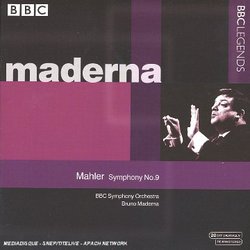| All Artists: Gustav Mahler, Bruno Maderna, BBC Symphony Orchestra Title: Mahler: Symphony No. 9 Members Wishing: 1 Total Copies: 0 Label: BBC Legends Original Release Date: 1/1/2006 Re-Release Date: 4/18/2006 Genre: Classical Styles: Historical Periods, Modern, 20th, & 21st Century, Symphonies Number of Discs: 1 SwapaCD Credits: 1 UPC: 684911417920 |
Search - Gustav Mahler, Bruno Maderna, BBC Symphony Orchestra :: Mahler: Symphony No. 9
 | Gustav Mahler, Bruno Maderna, BBC Symphony Orchestra Mahler: Symphony No. 9 Genre: Classical
|
Larger Image |
CD DetailsSimilar CDs |
CD ReviewsThe Ninth according to Mahlerna. Francisco Yanez Calvino | Santiago de Compostela, GALIZA, Spain. | 06/14/2006 (2 out of 5 stars) "Like many other Italian composers from his generation (Nono, Berio...), Bruno Maderna was in love with Mahler's music, in fact he told about Mahler: "In his symphonies I think we find a man in all his complexity, with all his mistakes and his dark sides, but at the same time illuminated by an inner tension that is the enormous". And this words really describe some of the lines of this Mahler's 9th conducted by Maderna, because of the great tension and dark presages we can listen in his performance, in which Maderna place Mahler just as the step before the Second School from Vienna. Mahler is revisited with very modern eyes, that of Berg or Schönberg, and not always this decision is right for Mahler's music.
The understanding of this Ninth on Maderna's hands is very close, in my opinion, to Berg's one, who notices an enormous desire of living in this score, just together with a continuous presence of death, seen not just as a philosophical subject, but lived in his own; a point of view very close to what Vignal wrote about Mahler's 9th, who wrote about this symphony that it was "death not yet felt, but death being lived", a point of view far from La Grange's opinion, who thinks that death is present much more as the remember of his beloved daughter's death, even more as a philosophical approach than a feeling on his own. Maderna choose a point of view very expressionistic and intense, and, at the same time, he breaks the melody and the symphony quite everywhere, like if the broken music were the mirror of a broken soul, that's Mahler's one. Maderna could think too that this music represents not only Mahler's end, but the end of tonality and the romantic period music. El Andante comodo is one of the slowest on CD (29:29). It begins very static and pale, so much that in some moments you really feel music is going to stop, like you can appreciate in the first main theme on the violins (1:58). This tempo demands a great effort to the BBC Symphony Orchestra that is not able to resolve in a complete satisfying way, showing a not complete coordination and technique for this complex approach Maderna wanted, like we can listen in the sequence horn-strings-woodwinds in the minute 4:48. The frightening rhythm of the drum, associated to death, or according to Leonard Bernstein, to a Herat of irregular pulse, close to fail appears in a tremendous way sometimes (7:54), like some entrances of the brasses, not very refined and technique, but terrible. In this first movement we can notice something common to the rest of the performance; that's a great flexibility on the tempo, quite excessive I think, with a `rubato' that's much more of what I found necessary and much more of what the score demands, from my point of view. The theme between minutes 12:31 and 13:21 is a clear example of this, in which he divide the theme strings-woodwinds into elemental cells in a very modern way for being Mahler, like if that cells were taken to their own death out of melody and tonal system, another example of what this symphony could be for Maderna. Second movement (14:18) is lighter, but without the rustic grace Mahler required in the different `laendler', and without the sarcasm he asked for. Maderna transforms the themes in a robotic style, like if these popular tunes became Berg's Wozzeck, they become mechanic in a very complex decision that doesn't work very well; stopped one more time with long silences (7:54-7:58, 8:33-8:37, 11:43-11:46), that will shock lot of listeners. The Rondo-Burleske is the best performed in this symphony, with energy (13.11), but once more playing with the time in a strange way (8:41-8:46), something that ruins some of the players themes, like the case of the flutes, in a extremely slow `decrecendo' (8:58-9:01), in which melody and tonality are close to break. All the theme harp-woodwinds-violin between minutes 9 a 10 is so slow that's amazing. The final Più stretto is fast and energetic one more time. The final Adagio is very light (21:00), specially on the beginning, something that ruins string playing, and that affects soloists solo playing too. In the Plötzlich wieder sehr langsam he returns to a slower tempo, and the music become much more deep. This Adagio is, one more time, all time broken by long silences, in a way I haven't heard before. The entrance of the a tempo (Bar 64) is preceded of a 3 seconds silence (6:18-6:21), and in this part, after the orchestral climax he introduces another pause of ¡5 seconds! (7:18-7:23), that is quite to break the line of the work. This silences are repeated in quite all the changes of themes (Bar 126, beginning of the Tempo I, 12:04-12:07, a silence in which we can listen at the recording background sounds not from this symphony), although the next orchestral entrances are highly emotive and full of power. El final Adagissimo (Bar 159, 16:28), is slow, trying to clarify all the lines that die in this final section, again terrifying silences that complete this deconstruction of Mahler's Ninth that Maderna did, revisiting this score with criteria probably not from Mahler's time.. We're facing a very personal performance, with extremely free criteria in conducting, but deep, emotive and intense like not many others. It's a way really not followed after Maderna's example; nowadays this symphony is done in a very different way. If you really want to explore a new way this performance is OK, perfect to discover new things, but if this you want a more perfect one, live recording too, full of emotion, perfect technically and a real wonder, you buy Leonard Bernstein with the Berliner Philharmoniker (DG), very good too Bernstein's one with Vienna, specially the final movement, a real miracle (DG, on DVD), those are my favourite performances for a live recording; in studio I'd choose Chailly (Decca) and Giulini (DG). Live recording with a good sound presence, but too much noise on the background. The sound is not a problem if you want to try this experiment on Mahler's Ninth. " |

 Track Listings (4) - Disc #1
Track Listings (4) - Disc #1

